If you’re wondering whether your site is at risk of unexpectedly being penalized or devalued by Google’s algorithmic updates, the answer is probably yes.
That’s because, in addition to wholesale shifts in the evolution of RankBrain, Google issues “broad core” updates to its algorithms, which are announced only after they’ve hit the airwaves. One happened in March of this year, followed by another in April.

You cannot optimize for them, and you cannot beat them to the chase.
The only solution for staying ahead of potentially impactful changes to your site’s organic ranking capabilities is to ensure you continuously audit and update your media properties.
That’s where an SEO website analysis comes in.
SEO website analysis, explained
To start, an “analysis” is generally defined as an examination of all pertinent details relating to a subject.
For our purposes, an SEO website analysis is the process by which we marketers shed light on the performance of our web pages. Because SEO also refers to off-page factors like link-building and (indirectly) social media engagement indicators, your analysis should, by extension, investigate these digital arenas as well.
There are no clear-cut guidelines to follow, as each company has its own objectives it is hoping to achieve through a website analysis. However, we can safely say that, upon the completion of your investigation, you should have an expert understanding of how search engines, site visitors and prospects interpret your site.
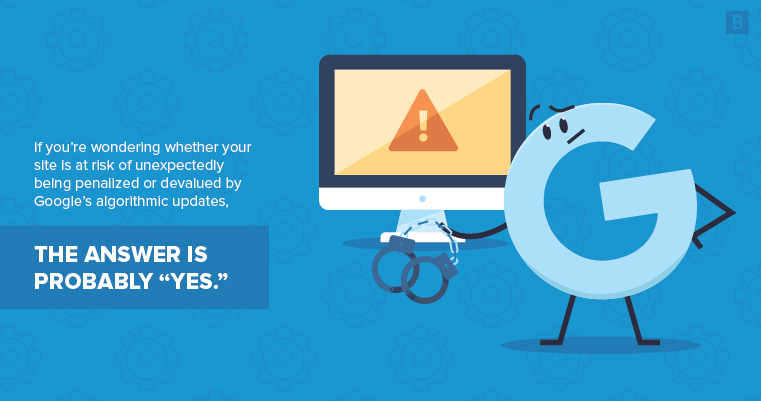
Sound difficult?
It’s not, really. We’ve compiled 25 of the best SEO website analysis tools that should equip you with quick insights and actionable business intelligence, most of which are available for free and can be run in a matter of seconds.
What to expect: content gaps, competitive analyses, inbound link profiles, social media performance, Google penalties, optimization opportunities, Domain Authority and Trust scores, Featured Snippet possibilities, keyword best practices, audience intent and much, much more.
2018’s tools to use
Let’s start by getting all the Google tools out of the way first (and we mean that in a good way!).
Google Analytics
This is the bread and butter. As we’ve said before, Google Analytics is THE platform you need to be using this year, next year and every year after if you need data on site and content performance (which you do).
Brafton’s Best Content Marketing Software of 2018 report says: „Trying to run a content marketing campaign without Google Analytics (is like) playing football with one arm while hogtied, blindfolded and being punched in the face.“ https://t.co/OjYN5EQ4RD /via @Brafton #measure pic.twitter.com/LKV2V6CGX5
— Google Analytics (@googleanalytics) April 25, 2018
GA allows you to track baseline metrics and then chart where your content is improving and where it is falling flat. You can also set up sophisticated campaigns through Goal Completions and Events Tracking, providing you with the hard dollar figures you need to report ROI to your boss.
Simply include the short snippet of GA tracking code on all your web pages, and you’re ready to get started.
Cost: Free
Google Search Console
Search Console is another must-have, and it integrates with Google Analytics as well.
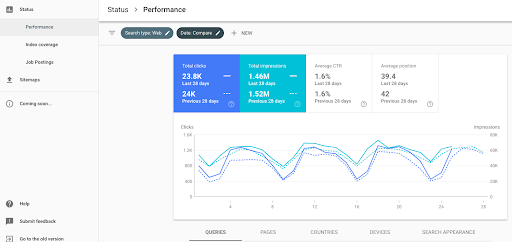
In addition to the numbers found in GA, you can discover enormous insights into how Google (and humans) view and interpret your site through Search Console.
Things like:
- Queries you appear in search for.
- Indexability and crawlability of web pages.
- Appearance in Featured Snippets.
- Total search position and visibility.
Cost: Free
Google PageSpeed Insights
This is exactly what it sounds like. By entering a URL, the tool analyzes your page speed (mobile and desktop), which you can then benchmark against industry standards and best practices.
It’s recommended that each page should load in fewer than two seconds – if not, then it’s likely users will bounce from the page (this is relative, however, as some pages serve specific purposes that may warrant longer load times).
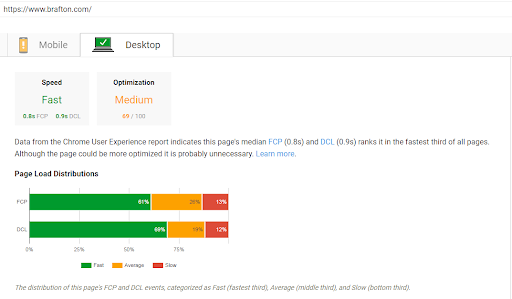
PageSpeed Insights also provides recommendations on optimizing your pages for stronger UX, such as image compression, browser caching and server configuration.
Cost: Free
Google Structured Data Testing Tool
There’s data, and then there’s structured data. SEO in 2018 requires more than just ranking on page one of search engines. You also need to strategize around earning Featured Snippets and other types of SERP features, which involves structuring your on-page data in a way that Google best understands.
The Structured Data Testing Tool lays out the HTML of your page, flags potential issues and validates whether your content is, in fact, eligible for rich results.

Cost: Free
Google Structured Data Markup Helper
To go one step further, the best tool to help you optimize and implement your structured data is the aptly named Google Structured Data Markup Helper.
Enter your URL, select your content type, and Google shows you which components of the page to tag with schema. This data is then used to serve SERP features like Rich Snippets, which provide greater context to users.
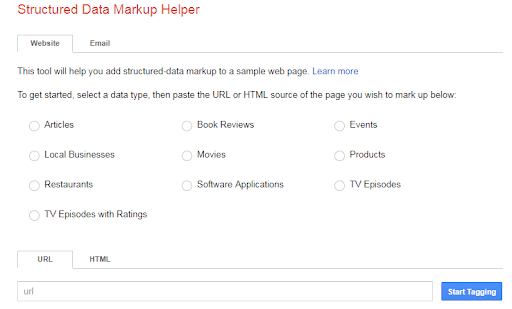
The goal is to make your organic listings as informational and experience-driven as possible, enticing higher click-throughs.
Cost: Free
SEMrush
SEMrush is a multifunctional tool, with features that dip into the entire spectrum of digital marketing, including SEO, content audits, keyword analytics, competitive analyses, link-building opportunities, PPC, topic research and more.

SEMrush also gets into the weeds with very granular, technical SEO via its rank-tracking campaigns, advertising research and content templates.
Cost: $99.95 – $399.95 monthly plans
Raven Tools
White-labeled SEO reports, backlink research, site audits, web crawls and more are part of the Raven Tools platform. By automating report-building and publishing, you can quickly share web analytics data with all stakeholders and implement necessary changes to your site.
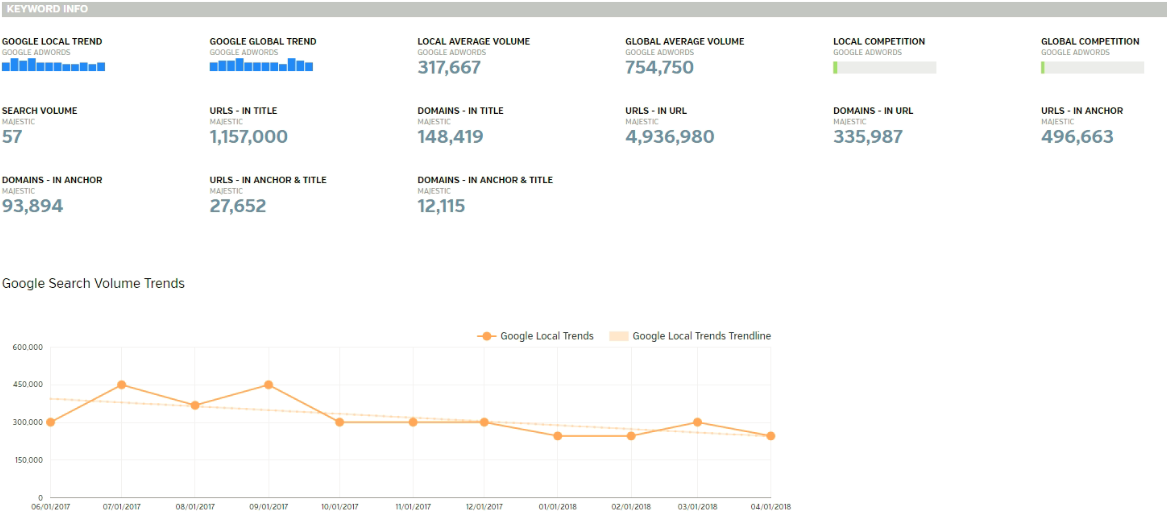
Cost: $99 – $399 monthly, but with a 14-day free trial
Searchmetrics
Searchmetrics has a dedicated suite of SEO functions like content optimization, organic visibility, site audits, domain comparisons and keyword analysis.

The tool can also be used for paid search campaigns and link optimization.
Cost: $69 minimum monthly, with larger packages available by phone only.
Seomator
Need an automated SEO audit widget? On- and off-page SEO analysis? Site crawls and content quality assessments?
Seomator can tackle all of the above with its cloud-based platform, then generate white-labeled PDF reports to show your findings.
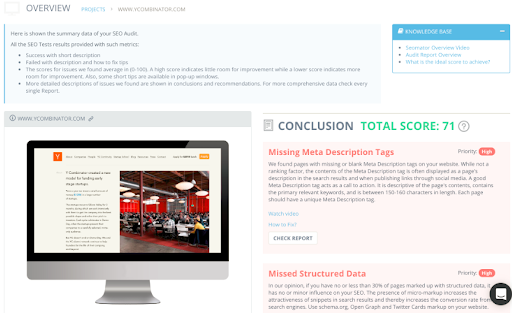
Cost: $5 pay as you go, or monthly plans from $19 – $179
Buzzsumo
Which types of content are being shared most on social media? What phrasing is best for headlines? How do word counts correlate to social engagement? These findings can add context to your SEO planning and provide a blueprint for how to earn more links.
Answer all these questions with Buzzsumo. It’s also great for brand monitoring, influencer marketing, content curation and keyword research.
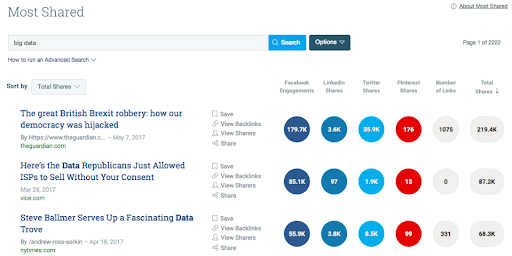
Cost: $99 – $499 monthly.
Moz
You can’t go wrong with Moz. Its clean interface and broad SEO capabilities make it a necessary addition to every content marketing program. Think SEO audits, Domain and Page Authority scores, rank tracking and even simple Chrome extensions that analyze sites in SERP in real time, as seen below:

Cost: $99 – $349 monthly.
Screaming Frog
Need quick SEO analysis without spending a dime?
Announcing @screamingfrog SEO Spider 9.0- https://t.co/4FsKZrXaJW.
Crawl millions of URLs with configurable database storage.
In-app memory management.
️ Store & view raw & rendered HTML.
Custom headers.
& lots more. Hope you like it. pic.twitter.com/JySprWHO3v
— Screaming Frog (@screamingfrog) February 26, 2018
Screaming Frog’s limited free edition allows you to crawl up to 500 URLs, uncover site errors, fix broken links and optimize your metadata.
Cost: Free
SpyFu
SpyFu operates in the digital reconnaissance space. It collects organic and paid search data from your top competitors’ domains over the past 11 years and then makes recommendations on where to invest your marketing spend and how to own valuable keywords.
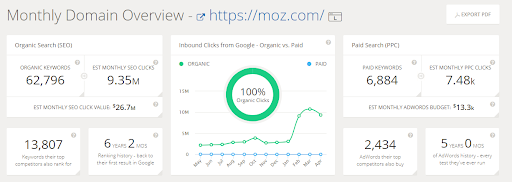
Its simple design makes SpyFu a UX-friendly platform. Add it to your SEO arsenal today.
Cost: $33 – $299 monthly
MarketMuse
Combine the power of artificial intelligence and content strategy and you have a powerful, versatile SEO analysis tool that gets the job done.
MarketMuse specializes in content gap audits, on-page optimization and singular topic analysis. With this information formatted neatly in a content brief, you can approach writing with all the data you need, making your chances of ranking much higher.
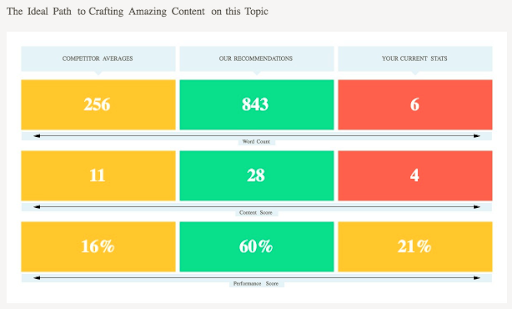
Cost: $500 monthly for a single license and to create your own briefs
BrightEdge
Similar to MarketMuse, BrightEdge uses AI to “power organic search performance.”
Its ContentIQ function resolves site errors and makes keyword optimization recommendations so that nothing stands in the way of positive organic results. And the Data Cube feature can show you which terms are Featured Snippet possibilities.

Cost: Not free, and by request only.
Others to look into
There’s no shortage of SEO website analysis tools, and many can be integrated into your current marketing initiatives. We suggest checking out each tool (both above and below) to see whether it suits your company’s needs.





